Search Results
Showing results 541 to 560 of 1054
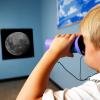
Exploring the Solar System: Hide and Seek Moon
Source Institutions
"Exploring the Solar System: Hide and Seek Moon" is an engaging way for early childhood learners to experiment with some of the tools scientists use to study objects that are very, very far away, and
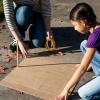
Ancient Sun Observations
Source Institutions
In this activity, learners make their own Sun tracker to explore how ancient civilizations around the world studied the Sun.

Super Soaking Materials
Source Institutions
In this activity, learners will test cups full of potting soil, sand, and sphagnum moss to see which earth material is able to soak up the most water.

The World's Water
Source Institutions
Water on Earth is in lakes, the ocean, rivers, underground, and frozen glaciers.
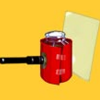
Turbidity
Source Institutions
This is an activity about turbidity, or the amount of sediment suspended in water.

Paleontologists: Can You Dig It?
Source Institutions
In this activity, learners explore the work of paleontologists.

Size it Up
Source Institutions
Learners investigate why the Sun and Moon appear the same size in the sky even though the Sun is over 400 times larger in diameter.
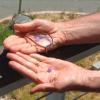
Exploring Ultraviolet (UV) light from the Sun
Source Institutions
In this outdoor activity, learners explore UV rays from the Sun and ways to protect against these potentially harmful rays.

Hot Stuff!: Investigation #3
Learners test two jars of ice water, one covered and one open, for changes in temperature. After placing the jars in the sun, learners discover that the covered jar cools down more slowly.
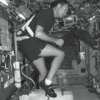
Challenge: Microgravity
Source Institutions
In this activity about the circulatory system and space travel (on page 38 of the PDF), learners use water balloons to simulate the effects of gravity and microgravity on fluid distribution in the bod
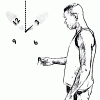
Knowing North: Understanding the Relationship between Time and the Sun
Source Institutions
This activity shows how our experience of the Sun changes with time and location. The sun dagger at Chaco Canyon is thought by many to be a sort of ancient timekeeping device.
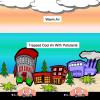
Turning the Air Upside Down: Convection Current Model
Learners see convection currents in action in this highly visual demonstration. Sealed bags of colored hot or cold water are immersed in tanks of water.
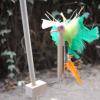
Woodpecker
Source Institutions
In this activity, learners construct a traditional handicraft toy that illustrates a motion commonly associated with violins and earthquakes.

Play Dough Moon Phases
Source Institutions
In this activity, young learners will learn about moon phases using materials found at home. This activity is adapted using play dough and cups to avoid food allergens and waste.
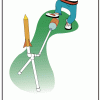
Pop! Rocket Launcher
Source Institutions
In this activity, learners construct a simple air pressure launcher for paper rockets.

Salt Water Revival
Source Institutions
In this outdoor activity, learners visit the intertidal zone of a rocky coastal site well populated with marine organisms.

Differing Densities: Fresh and Salt Water
Source Institutions
In this activity, learners visualize the differences in water density and relate this to the potential consequences of increased glacial melting.

Off Base
Source Institutions
In this activity, learners explore the factors that tend to resist changes in pH of the ocean and why the ocean is becoming more acidic.

I Can't Take the Pressure!
Learners develop an understanding of air pressure in two different activities.

What's Hiding in the Air?: Rubber Band Air Test
Learners build devices from rubber bands to test for invisible air pollutants.
